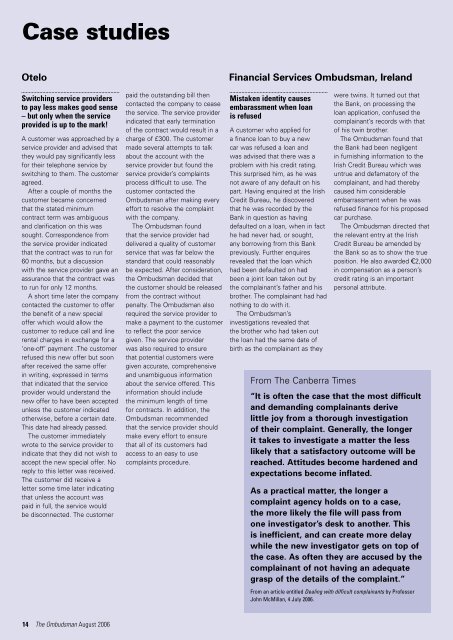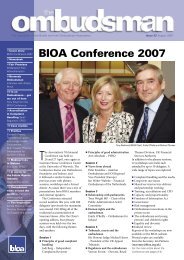29 Ombudsman.indd - British and Irish Ombudsman Association
29 Ombudsman.indd - British and Irish Ombudsman Association
29 Ombudsman.indd - British and Irish Ombudsman Association
You also want an ePaper? Increase the reach of your titles
YUMPU automatically turns print PDFs into web optimized ePapers that Google loves.
Case studies<br />
Otelo<br />
Switching service providers<br />
to pay less makes good sense<br />
– but only when the service<br />
provided is up to the mark!<br />
A customer was approached by a<br />
service provider <strong>and</strong> advised that<br />
they would pay significantly less<br />
for their telephone service by<br />
switching to them. The customer<br />
agreed.<br />
After a couple of months the<br />
customer became concerned<br />
that the stated minimum<br />
contract term was ambiguous<br />
<strong>and</strong> clarification on this was<br />
sought. Correspondence from<br />
the service provider indicated<br />
that the contract was to run for<br />
60 months, but a discussion<br />
with the service provider gave an<br />
assurance that the contract was<br />
to run for only 12 months.<br />
A short time later the company<br />
contacted the customer to offer<br />
the benefit of a new special<br />
offer which would allow the<br />
customer to reduce call <strong>and</strong> line<br />
rental charges in exchange for a<br />
‘one-off’ payment .The customer<br />
refused this new offer but soon<br />
after received the same offer<br />
in writing, expressed in terms<br />
that indicated that the service<br />
provider would underst<strong>and</strong> the<br />
new offer to have been accepted<br />
unless the customer indicated<br />
otherwise, before a certain date.<br />
This date had already passed.<br />
The customer immediately<br />
wrote to the service provider to<br />
indicate that they did not wish to<br />
accept the new special offer. No<br />
reply to this letter was received.<br />
The customer did receive a<br />
letter some time later indicating<br />
that unless the account was<br />
paid in full, the service would<br />
be disconnected. The customer<br />
paid the outst<strong>and</strong>ing bill then<br />
contacted the company to cease<br />
the service. The service provider<br />
indicated that early termination<br />
of the contract would result in a<br />
charge of £300. The customer<br />
made several attempts to talk<br />
about the account with the<br />
service provider but found the<br />
service provider’s complaints<br />
process difficult to use. The<br />
customer contacted the<br />
<strong>Ombudsman</strong> after making every<br />
effort to resolve the complaint<br />
with the company.<br />
The <strong>Ombudsman</strong> found<br />
that the service provider had<br />
delivered a quality of customer<br />
service that was far below the<br />
st<strong>and</strong>ard that could reasonably<br />
be expected. After consideration,<br />
the <strong>Ombudsman</strong> decided that<br />
the customer should be released<br />
from the contract without<br />
penalty. The <strong>Ombudsman</strong> also<br />
required the service provider to<br />
make a payment to the customer<br />
to reflect the poor service<br />
given. The service provider<br />
was also required to ensure<br />
that potential customers were<br />
given accurate, comprehensive<br />
<strong>and</strong> unambiguous information<br />
about the service offered. This<br />
information should include<br />
the minimum length of time<br />
for contracts. In addition, the<br />
<strong>Ombudsman</strong> recommended<br />
that the service provider should<br />
make every effort to ensure<br />
that all of its customers had<br />
access to an easy to use<br />
complaints procedure.<br />
Financial Services <strong>Ombudsman</strong>, Irel<strong>and</strong><br />
Mistaken identity causes<br />
embarassment when loan<br />
is refused<br />
A customer who applied for<br />
a finance loan to buy a new<br />
car was refused a loan <strong>and</strong><br />
was advised that there was a<br />
problem with his credit rating.<br />
This surprised him, as he was<br />
not aware of any default on his<br />
part. Having enquired at the <strong>Irish</strong><br />
Credit Bureau, he discovered<br />
that he was recorded by the<br />
Bank in question as having<br />
defaulted on a loan, when in fact<br />
he had never had, or sought,<br />
any borrowing from this Bank<br />
previously. Further enquires<br />
revealed that the loan which<br />
had been defaulted on had<br />
been a joint loan taken out by<br />
the complainant’s father <strong>and</strong> his<br />
brother. The complainant had had<br />
nothing to do with it.<br />
The <strong>Ombudsman</strong>’s<br />
investigations revealed that<br />
the brother who had taken out<br />
the loan had the same date of<br />
birth as the complainant as they<br />
From The Canberra Times<br />
were twins. It turned out that<br />
the Bank, on processing the<br />
loan application, confused the<br />
complainant’s records with that<br />
of his twin brother.<br />
The <strong>Ombudsman</strong> found that<br />
the Bank had been negligent<br />
in furnishing information to the<br />
<strong>Irish</strong> Credit Bureau which was<br />
untrue <strong>and</strong> defamatory of the<br />
complainant, <strong>and</strong> had thereby<br />
caused him considerable<br />
embarrassment when he was<br />
refused finance for his proposed<br />
car purchase.<br />
The <strong>Ombudsman</strong> directed that<br />
the relevant entry at the <strong>Irish</strong><br />
Credit Bureau be amended by<br />
the Bank so as to show the true<br />
position. He also awarded €2,000<br />
in compensation as a person’s<br />
credit rating is an important<br />
personal attribute.<br />
“It is often the case that the most difficult<br />
<strong>and</strong> dem<strong>and</strong>ing complainants derive<br />
little joy from a thorough investigation<br />
of their complaint. Generally, the longer<br />
it takes to investigate a matter the less<br />
likely that a satisfactory outcome will be<br />
reached. Attitudes become hardened <strong>and</strong><br />
expectations become inflated.<br />
As a practical matter, the longer a<br />
complaint agency holds on to a case,<br />
the more likely the file will pass from<br />
one investigator’s desk to another. This<br />
is inefficient, <strong>and</strong> can create more delay<br />
while the new investigator gets on top of<br />
the case. As often they are accused by the<br />
complainant of not having an adequate<br />
grasp of the details of the complaint.”<br />
From an article entitled Dealing with difficult complainants by Professor<br />
John McMillan, 4 July 2006.<br />
14 The <strong>Ombudsman</strong> August 2006





